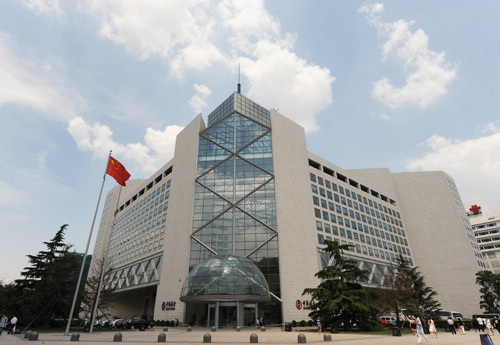|
 |
|
MAJOR PLAYER: Bank of China is one of the "big four" state-owned commercial banks (CFP) |
The People's Bank of China, the central bank, recently responded to a report—Financial Sector Assessment for China—jointly issued by the International Monetary Fund (IMF) and the World Bank on November 15, saying that the report was overall objective and positive, and the recommendations on the future reforms are constructive.
But the central bank pointed out that a few points are not sufficiently well-rounded or objective, and the time frame and priorities of some proposed reform measures need to be further analyzed by taking China's actual situations into account.
In the report, the IMF repeated its call for interest rate reform, arguing that market-driven interest rates would engender a more commercially minded banking system which would then clear the way for the full opening up of the capital account. It also urged Chinese authorities to loosen currency controls and give autonomy to the central bank and other supervisory bodies to help bring the system more in line with international practices.
"After years of reform, China's financial system has made considerable progress toward commercialization," said the central bank.
"With the completion of the stockholding reforms of major financial institutions, the government's involvement in the financial system is now through participation in corporate governance as shareholders and through nominated directors, instead of direct and administrative means."
As for macro adjustment of the credit supply, the People's Bank of China abolished credit quota for commercial banks since 1998.
Currently, the central bank adjusts market liquidity primarily by indirect and market-oriented measures, such as open market operations, reserve requirement ratio and interest rates. In addition, reforms of the interest rate and exchange rate regime have made significant progress with market forces playing a fundamental role in the formation of interest rate and the yuan exchange rate, said the central bank.
"The government's sway over financial markets has already evolved from direct intervention to asserting influence through regulation of financial companies," it added.
The central bank also pledged to strengthen cooperation and exchanges with international financial institutions to promote steady development of its financial sector and prevent risks.
Hui Feng, a researcher at the University of Queensland in Brisbane, Australia, said China may adopt a few of the IMF's suggestions.
"But I don't see any momentum for a more fundamental reform of the financial system anytime soon, unless there is a systemic crisis that jeopardizes economic and social stability," he said.
Zhao Qingming, a researcher with the China Construction Bank, recognized IMF's proposal to diversify financing channels and wean off over-dependence on bank loans.
"Chinese firms, especially smaller ones, still lack a permanent and effective source of funding," he said. "Solving the problem requires faster development of the securities and insurance markets."
But Xie Taifeng, President of the School of Finance of Capital University of Economics and Business, raised doubts over the IMF's suggestion about interest rate liberalization.
"Hasty financial liberalization will also ignite risks as smaller banks may scramble to bump up interest rates to attract deposits, posing a threat to financial stability," he said.
The report recognized China's achievements in financial commercialization, regulation and infrastructure.
"China has made remarkable progress in its transition toward a more commercially oriented and financially sound system," said the report.
"Improvements continue to be made to the structure, performance, transparency, and oversight of financial institutions and markets. As a result, the financial sector entered the global financial crisis from a position of relative strength," said the IMF.
The Financial Sector Assessment Program was launched in May 1999 to help strengthen the assessment and monitoring on global financial stability. China is one of the 25 countries that have agreed to mandatory evaluations at least once every five years, though the country has no obligation to implement the recommended reforms.
"China's financial system is robust overall, but faces a steady build-up in vulnerabilities," said the report. "Further reforms are needed to support financial stability and encourage strong and balanced growth."
| 